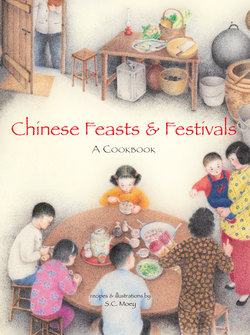Читать книгу Chinese Feasts & Festivals - S. C. Moey - Страница 11
На сайте Литреса книга снята с продажи.
ОглавлениеAuthor’s Preface
It is often said that the Chinese live to eat. Happily for them, China’s rich history and culture have, with heaven’s mandate, conspired to fill the traditional calendar with a generous round of festivities at which all their gastronomic longings can be fulfilled.
One good turn deserves another. To honor the benevolent powers that make all things possible, the Chinese install in their homes various guardians—some people call them gods—who at the appropriate times are invited to participate in human festivities and are plied with food and drink. The gods eat the spiritual essence of the offerings and man consumes the delectable substance. Chinese ancestors, who are considered on a par with the gods, are revered and worshiped in the same way with a glorious repast.
Cooking for both man and the gods is thus an event rich in symbolism—bringing wealth, happiness, luck and prosperity—all the things that man desires and which the gods can provide. Cooking for important festive occasions like this may seem like a formidable task, and certainly in the old days it was an enormous job, though nobody minded or even noticed. Fowls had to be plucked. Shark’s fins, sea cucumbers, bamboo shoots, to name just a few of the ingredients, needed to be soaked, cleaned, boiled and re-boiled—processes that could take several days. There were no short cuts, no labor-saving devices, and everything had to also be cooked over charcoal fires. For most cooks today, these would present insurmountable obstacles. Fortunately, time has taken much of the hard work out of cooking. Today, it is possible to cook for feasts and festivals without breaking one’s back. It can be quite an enjoyable exercise, in fact, thanks to refrigeration, the wide range of modern kitchen appliances available, and the presence of supermarkets stocked with ready-to-use ingredients.
I am privileged to come from a family whose ways are steeped in tradition, and to live in a community which takes great pride in the vibrant expression of its culture. From this great storehouse of knowledge and experience, I have been able to assemble a few culinary facts and fancies, as well as a collection of recipes for the Chinese food lover to read and enjoy or, if the spirit takes flight, to use in cooking up a feast that will impress the ancestors, win approval from the gods, and certainly please the family as well as friends.
S.C.Moey
Penang, 2005
